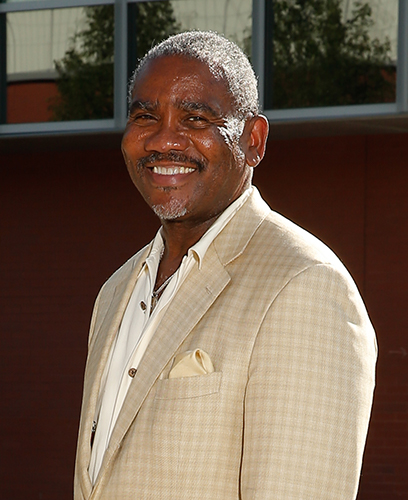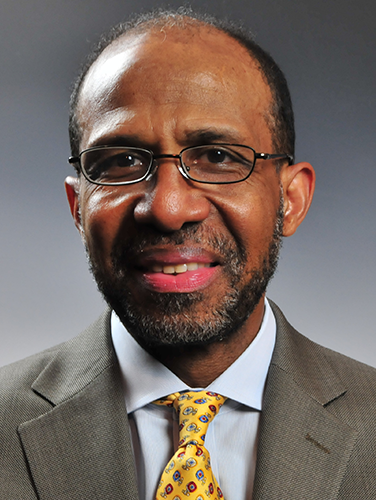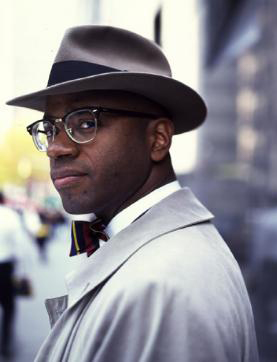On December 1, 2014, the plaza was teeming with more than 200 students, faculty members and administrators who gathered for a Hands Up! Don’t Shoot! rally.
Before August 2014, few people had heard of Ferguson, Missouri. Most people, especially most New Yorkers, would have been hardpressed to find it on a map. Since then, times have changed.
The St. Louis suburb has since become shorthand for racial injustice in our country. For some, the killing of Michael Brown and the subsequent incidents of videotaped brutality in Staten Island, Baltimore, Cleveland and Charleston—among others—were a wake-up call. For others, they were the long-awaited evidence that racial profiling, excessive force against people of color and overall iniquity in the criminal justice system are nothing new.
Recent Adelphi graduate Trevena Goulbourne ’14, M.A. ’15, falls into the latter camp, and she is hardly alone. Other Adelphi alumni, including Congressman Gregory Meeks ’75, well-known defense attorney Anthony Ricco ’78 and Matthew Johnson, Ph.D. ’84, an associate professor at John Jay College of Criminal Justice, join her. All of them recently spoke to AU VU about issues related to race and law enforcement and what they have done personally and professionally to address those issues.

“Millennials are now stepping to the front and stepping ahead on this issue. Hands up! Don’t shoot! Was to get people thinking.” —Trevena Goulbourne ’14, M.A. ’15
Goulbourne has long been troubled by the racial disparities that have affected her and members of her family and community. Last fall, she converted her anger into action.
During the chill of late fall, the plaza in front of Adelphi’s Ruth S. Harley University Center is hardly a happening place. Most students, faculty and administrators rush through on their way someplace else, preferably somewhere warm.
But at midday on December 1, 2014, the plaza was teeming with more than 200 students, faculty members and administrators who gathered for a Hands Up! Don’t Shoot! rally, organized to protest the deaths of Michael Brown, Eric Garner and others. Most came out to voice concerns about police misconduct and rampant racism. A few expressed dissenting opinions. Overall, the rally revealed deep and widespread passions, which are normally held in check on Adelphi’s polite and friendly campus.
Goulbourne, who at the time was a graduate student at the Ruth S. Ammon School of Education, organized the event with the assistance of some administrators and faculty members.
Among them were Professor Marsha J. Darling, Ph.D., who directs Adelphi’s African, Black and Caribbean Studies program; Associate Provost for Faculty Affairs and Diversity Perry Greene, Ph.D.; Professor Devin J. Thornburg, Ph.D.; and members of the Department of Public Safety.
“We pulled together the protest in four days,” Goulbourne said. She added, “The media has sometimes depicted millennials as not caring about anything, but I think the response to the Hands Up! Don’t Shoot! rally shows that we do care about how people are being treated.”
Goulbourne said that she has long been painfully aware of racial profiling and its effects on people in her community, including friends and family members. “I think there is a disconnect between how law is enforced and what regular people experience,” Goulbourne said. In her opinion, “It doesn’t matter what degree you hold: as long as you are a person of color, the reality is that you will get stopped.”
The summer before organizing the rally, Goulbourne worked as an event marketing intern at the National Urban League. The paid internship was supported by Adelphi’s Jaggar Community Fellows Program, which pays undergraduates for summer work at area nonprofits. Goulbourne noted in a previous interview that “That internship had so much to do with the way that I chose to lead the Hands Up! Don’t Shoot! rally here on campus.” Through the internship, Goulbourne learned how to engage millennials in important civic issues. Goulbourne’s motivation for planning the rally was to raise awareness on campus. “Millennials are now stepping to the front and stepping ahead on this issue. Hands Up! Don’t Shoot! was to get people thinking—to see that this is being discussed on a college campus. These become conversations in homes and communities.” A teach-in that Goulbourne participated in prior to the rally underscored for her the importance of involving law enforcement in the dialogue on racial profiling. “We had a police officer come, and he spoke about what you should do if you are stopped,” she recalled. “We also had a representative from a family who had lost a member due to police action. Congressman Greg Meeks also participated. I think we should continue to invite law enforcement to speak about a variety of issues. We should have ongoing involvement, and I think college is a great place to start this dialogue.”

“I learned that if you are not silent, and organized, you can make a difference.” —Congressman Gregory Meeks ’75
Gregory Meeks agrees that colleges should encourage young people to question the status quo and “not just go along to get along.” In his view, “College should be the place where, hopefully, a diverse, multicultural group of students works to make the country and the world better.” At Adelphi from 1971 to 1975, Meeks—one of a small number of African American students at the time—helped establish the Black Student Union, which he also chaired, in order to advocate for increasing the number of African American students on campus and better serving the ones already there. “I learned that if you are not silent, and organized, you can make a difference,” he recalled. “At that time, demonstrations led to conversations.” And conversations brought results. Among them were specific scholarships, such as the Malcolm X Scholarship, to support African American and Hispanic students.
For the past 17 years, Meeks has represented New York’s 5th Congressional District, which encompasses southeast Queens and a small portion of Nassau County and has a largely African American population. Meeks noted that the spotlight that is now on the criminal justice system is helping him and others change the system. “When you talk about police brutality and racial profiling, and you start having body cameras and cell phones, you have a lot of people not being silent,” Meeks said. “When these incidents are viewed, you have more of an interracial response, and people who were silent say, ‘The black people in this country are not making this up.’ Now you see many states all looking at reviewing their policies.”
A co-sponsor of the Excessive Use of Force Prevention Act of 2015, Meeks stressed that, “It is not just a New York issue, it is a national issue.” The legislation, introduced following the death of Staten Island resident Eric Garner, will make the use of a choke hold unlawful under federal civil rights law. “Thelegislation against the choke hold is not just for Queens, New York City and New York State; it would be nationally enforced,” Meeks said.
More locally, Meeks works to create stronger connections between members of law enforcement and the communities they serve, despite a tighter budget. “When you move from drive-by policing to having police walk the beat in communities, it has a positive impact,” he said. “Some federal dollars were cut, and there was a move away from community policing. In my district, I do town hall meetings where I consistently try to bring in someone from the police department so the police officers can get to know community leaders. I even encourage community members to go to roll calls at their local precincts so they learn the names behind the faces of the officers.”

“What hasn’t changed enough during my lifetime is the focus, or lack thereof, on the disparities in education, healthcare, services and employment”—Matthew Johnson, Ph.D. ’84
Like Meeks, John Jay College Professor Matthew Johnson sees the benefit of community policing, but, even more important, he asserts, is self-monitoring by police. “It’s very difficult to get police officers to testify on other officers who they think are involved in misconduct,” he said. “For the police to improve their professional work, they must make more effort to correct issues within the ranks.” He added that in many states, complaints against an officer are not discoverable, especially if they are not recorded or filed. “An increased effort” in police monitoring themselves “would be acknowledged by the public,” Dr. Johnson said.
Officers also would benefit from better knowledge of the people they are called on to subdue. “There have been deaths when police unknowingly try to apprehend someone suffering from mental illness.”
For Dr. Johnson, vigilance is key. “Overall, the public needs to be vigilant when it comes to these issues,” he said. As a professor at John Jay, where many students aspire to work in law enforcement, Dr. Johnson has a hand in influencing future enforcers.
Dr. Johnson originally applied to Adelphi’s doctoral program in psychology with the intention of becoming an expert witness. He knew Dean Gordon F. Derner, Ph.D., and was impressed by his commitment to diversity. “The year before my admission into the Derner Institute, I was told that 25 percent of all blacks with doctorates in clinical psychology had attended Adelphi.”
Today, Dr. Johnson is a teacher and scholar who examines how psychology informs due process. He also has extensive experience as a forensic examiner and expert witness. He is intimately familiar with the prevalence of false confessions, especially among the most marginalized defendants.
He noted that clients with reading deficits or those who undergo long interrogations are more likely to give false confessions. “In New York, police can interrogate a person for five, six or seven hours and only video the section where the suspect makes the admission” so you don’t know if the person is guilty or just tired of being questioned, said Dr. Johnson.
“There are times,” Dr. Johnson said, “when I have to evaluate whether a person was competent to make the admission.” Another fact that must be established by a defense attorney, assisted by an expert witness, is “How much did the police tell the individual. Sometimes the police tell them, ‘We know you did it. Your buddy already said you did, so this is your chance to admit.’”
While police accountability is vital to Dr. Johnson, he readily acknowledges that the spotlight on law enforcement has cast a shadow on the other factors that lead to distrust and ongoing racial tension in some communities. “What hasn’t changed enough during my lifetime is the focus, or lack thereof, on the disparities in education, healthcare, services and employment that some communities have and others do not,” he said. “All of these factors accumulate and the police become the most visible point of social antagonism.”

“I look at these issues not just as a lawyer, but also as a father and a husband.”—Anthony Ricco ’78
Anthony Ricco describes himself as “a kid from Harlem” who came to Adelphi with the support of the Malcolm X Scholarship that Meeks helped establish. “Apparently, people saw things in me that I didn’t see for myself,” Ricco, now a prominent criminal defense attorney, said. “The boy that Adelphi gave a chance with a scholarship is now devoted to excellence and committed to working toward it.”
Ricco’s view of the criminal justice system is intimate and personal. He has defended murder suspects ranging from Corey Arthur, the young African American man tried for the 1997 murder of his white high school teacher, Jonathan Levin, to a co-conspirator in the Sheik Omar Abdel Rahman terrorism case.
For Ricco, the criminal justice system is a mirror for society as a whole. “In the criminal justice system, we see the racial dynamics of America being played out—big time,” he said.
In the courtroom, Ricco observes how prosecutors can shape the outcome, even by not fully informing jurors. “In the case of Eric Garner, what you really had was reckless endangerment which resulted in death. However, if the grand jury is not instructed in this way,” then there will not be a sentence based on reckless endangerment. He added, “A prosecutor can shape the material that a grand jury sees, and the general public has not been allowed to see the Garner case grand jury testimony.”
Noting that some have accused him of police bashing, Ricco said that that couldn’t be farther from the truth. “If someone bashes in my window to rob me, I’m going to call 911, and I want the police to do what they need to do to keep me and my family safe,” he added.
“I look at these issues not just as a lawyer, but also as a father and a husband,” said Ricco, who, after completing his education, returned to Harlem to settle and raise his family.
Ricco expressed cautious optimism that change is possible. “It’s going to take a special breed of judges, prosecutors and police to change things—those that can look at today’s problems and see beyond race. One of the things I learned…was that the goal of the African American lawyer is to see that African Americans have all the rights in the courts as everyone else. No more and no less.” Stressing that he believed in the U.S. Constitution and its amendments, as well as the right to counsel and the legality of search and seizure, Ricco added, “We live in a country of beautiful laws, but we allow those laws to be compromised.”
For further information, please contact:
Todd Wilson
Strategic Communications Director
p – 516.237.8634
e – twilson@adelphi.edu